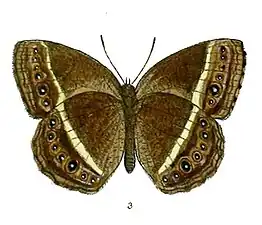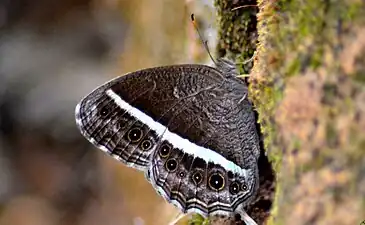| Palni bushbrown | |
|---|---|
 | |
| as illustrated in Lepidoptera Indica | |
 | |
| from Kerala | |
| Scientific classification | |
| Kingdom: | |
| Phylum: | |
| Class: | |
| Order: | |
| Family: | |
| Tribe: | |
| Genus: | |
| Species: | H. davisoni |
| Binomial name | |
| Heteropsis davisoni (Moore, [1891]) | |
| Synonyms | |
Heteropsis davisoni, the Palni bushbrown,[5] is a species of satyrine butterfly found in southern India.[6][2] Some authors consider this as a subspecies of Heteropsis mamerta[6] or Mycalesis malsara[7] or Mycalesis lepcha.[8]
Description
Male. Upperside dark olivescent ochreous-brown, Both wings with a faint trace of the discal transverse band of the underside seen from above; cilia whitish and distinctly alternated with black at end of the veins. Fore-wing with a small black spot between the middle and lower median veins. Hind-wing with two small black spots, of which the upper one is between the upper and middle medians and the other between the middle and lower medians; submarginal lunular lines pale, indistinct, the intervening line and the extreme marginal line of both wings being blackish.
Underside darker, purpurescent in tint; basal area with numerous indistinct black strigae. Both wings with a prominent sharply-defined white transverse discal baud, the outer edge of which is blackish; marginal lunular lines ochreous. Fore-wing with six ocelli on a purple-brown ground-colour, of which the four upper are minute and the third and fourth incomplete; the fifth (between the middle and lower median) moderately large, the sixth minute, and the whole encompassed by the ordinary pale violet-grey line. Hind-wing with seven ocelli, on a purple-brown ground-colour, of which the three middle ones are somewhat pointed externally, and the third, fourth, and seventh the smallest. Male with a small patch of black scales on underside of the fore-wing, and a similar patch on the upper-side of hind-wing overlapped by a sub-basal tuft of brown hairs.
Body dark brown; palpi and legs paler; edges of palpi ochreous. Antennas bright ochreous towards the end, with the tip black.
References
- 1 2
 One or more of the preceding sentences incorporates text from this source, which is in the public domain: Moore, Frederic (1890). Lepidoptera Indica. Vol. I. London: Lovell Reeve and Co. p. 206.
One or more of the preceding sentences incorporates text from this source, which is in the public domain: Moore, Frederic (1890). Lepidoptera Indica. Vol. I. London: Lovell Reeve and Co. p. 206. - 1 2 Savela, Markku. "Mycalesis Hübner, 1818 Bushbrowns". Lepidoptera - Butterflies and Moths. Retrieved 2018-03-18.
- ↑ Aduse-Poku, Kwaku; Lees, David C.; Brattström, Oskar; Kodandaramaiah, Ullasa; Collins, Steve C.; Wahlberg, Niklas; Brakefield, Paul M. (2016). "Molecular phylogeny and generic-level taxonomy of the widespread palaeotropical 'Heteropsisclade' (Nymphalidae: Satyrinae: Mycalesina)". Systematic Entomology. 41 (4): 717–731. doi:10.1111/syen.12183.
- ↑ Kodandaramaiah, U., D. C. Lees, C. J. Müller, E. Torres, K. P. Karanth and N. Wahlberg. 2010. "Phylogenetics and biogeography of a spectacular Old World radiation of butterflies: the subtribe Mycalesina (Lepidoptera: Nymphalidae: Satyrini)". BMC Evolutionary Biology, [10:172 (PDF)
- ↑ "Telinga davisoni Moore, 1892 – Palni Bushbrown". Butterflies of India. Indian Foundation for Butterflies. Retrieved 2 May 2018.
- 1 2 R.K., Varshney; Smetacek, Peter (2015). A Synoptic Catalogue of the Butterflies of India. New Delhi: Butterfly Research Centre, Bhimtal & Indinov Publishing, New Delhi. pp. 175–171–172. doi:10.13140/RG.2.1.3966.2164. ISBN 978-81-929826-4-9.
- ↑ Bingham, Charles Thomas (1905). Fauna of British India. Butterflies Vol. 1. London, Taylor and Francis; Calcutta and Simla, Thacker, Spink, & Co.; [etc.,etc.] p. 65.
- ↑ Evans, W.H. (1932). The Identification of Indian Butterflies (2nd ed.). Mumbai, India: Bombay Natural History Society. p. 101.